UK Artists 1978-97
The UK Artists: 1978 – 1997
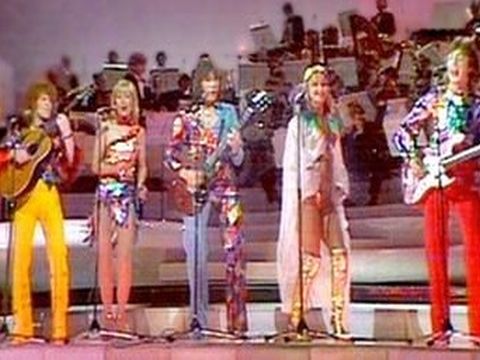
1978 The Bad Old Days – Coco
1978 saw another twelve song final, but the list of entrants was quite significantly lesser known than the previous years, a trend that would sadly be continued in subsequent SFEs. Labi Siffre was about the only notable artist, at least winners Co-Co perhaps deserved a chance at Eurovision as they had only lost out by a couple of points two years earlier. This final saw a higher number of black performers than previously and their collective lack of success caused dismay in some quarters at the time. Coco’s tenth place in Paris was then a new low for the UK. Cheryl Baker of course finally won the whole thing in 1981 as part of Bucks Fizz.
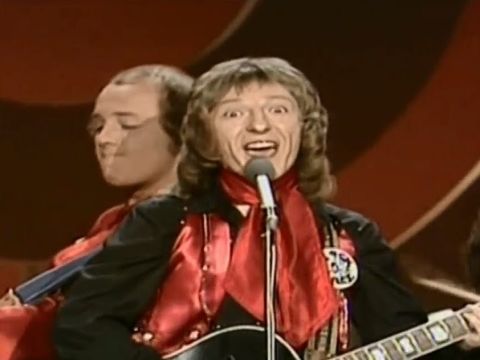
1979 Mary Ann – Black Lace
The 1979 contest was again marred by BBC strike action, this time not even being broadcast on radio. The regional juries reached their decision based upon cassette recording, that is, all but the Manchester jury which could not be contacted!. Guys and Dolls, Herbie Flowers and the mighty Nolan Sisters were thus unable to strut their stuff to the nation, and so perhaps it’s no surprise that the rather banal “Mary Ann” took the crown. Black Lace went ballistic in the eighties with party anthems like “Agadoo” & “Superman” but their first stab at stardom was “Mary Ann”. In those days they were a four piece group rather than a duo and their song was not a novelty one. Alan Barton went on to join Smokie but died in a minibus crash in 1995.
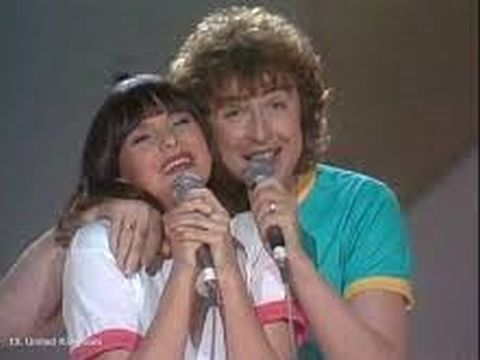
1980 Love Enough For Two- Prima Donna
After the previous years debacle it was inevitable that SFE would be a less attractive proposition for established acts and so the 1980 contest saw yet another reduction in even semi-famous names. Most of 1978 winners Co-Co were back, now calling themselves The Main Event, but they finished a resounding last of the dozen songs. Perhaps the best known artist was Maggie Moone and her very strong song finished equal top before sadly being pipped in a tie-breaker. With A New Seeker’s husband and the brother of a Bucks Fizzer, Prima Donna were pretty much the usual suspects for a built-for-Eurovision group and defied the critics to place third at Eurovision. The group included actresses Kate Robbins and Sally Ann Triplett who both went on to further glory.
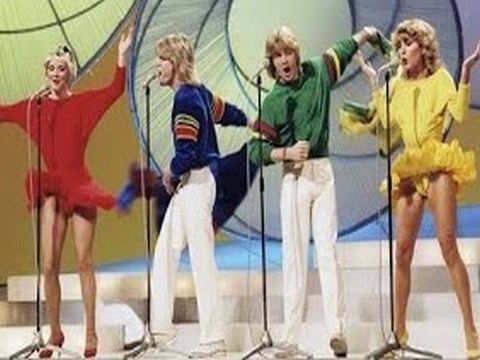
1981 Making Your Mind Up – Bucks Fizz
1981 saw the SFE continue to contract and diminish as the number of finalists was reduced from twelve to eight. Gary Benson who’d had a hit with his own composition from the 1975 SFE returned as a performer this time, but by far the biggest names were pop/disco band Liquid Gold, who came a strong second but had to give best to Bucks Fizz. The song in fourth place, “Have You Ever Been In Love” went on to be a huge hit for Leo Sayer a year later.
A cheesy song and some skirt-stripping brought the fourth UK victory and a UK number one, followed by two more chart toppers in the next twelve months!. They continued to release singles throughout the eighties and after many line-up changes are still around, although now in two versions after several legal battles.
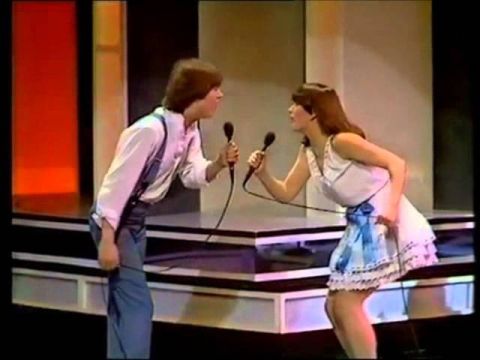
1982 One Step Further – Bardo
Despite the success of “Making Your Mind Up”, the 1982 SFE did not see big names queueing up to defend the crown in Harrogate, in fact quite the opposite. The winning song by Bardo was virtually indistinguishable from most of the songs around it. Paul Curtis, who was a constant presence a as songwriter in 1980s SFE, took his first bow as a performer. The most interesting song was “Dancing In Heaven” by Q-Feel which became something of a cult electro dance classic, and even cracked the American Hot 100 seven years later!. Sally Ann Triplett from Prima Donna was back with partner Stephen Fischer and the same production team as Bucks Fizz but some dodgy choreography and vocals scuppered any chance of a repeat victory. The couple were an item off stage too for several years. Sally has recently starred in Acorn Antiques The Musical as Miss Berta.
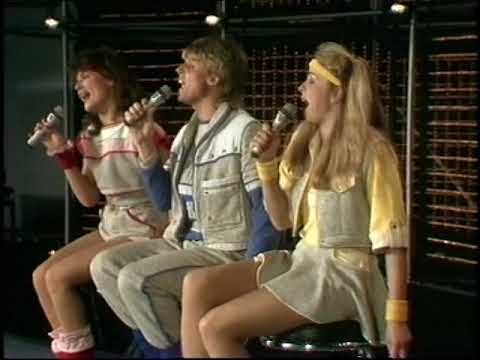
1983 I’m Never Giving Up – Sweet Dreams
By 1983 the curse of Bucks Fizz was in full swing as SFE was swamped with bouncy, upbeat tunes sung by manufactured “groups”. Whether it was one-guy-two-girls, two-guys-two-girls, or any other permutation the sound remained the same, and quite often the singers too would be recruited each year from the same pool of beaming wannabees. Sweet Dreams triumphed with their headbands and stool based choreography. Their unremittingly cheery song managed sixth place but was most notable for the inclusion of BBC casting show regular Carrie Grant. A follow up single failed to chart and the sweet dream was over.
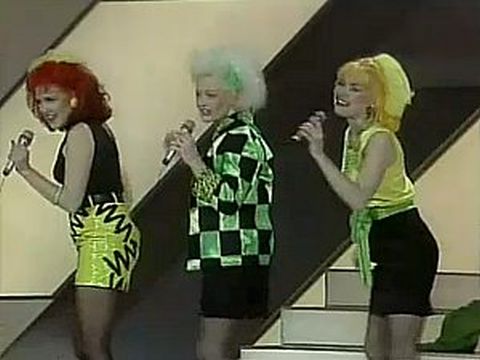
1984 Love Games – Belle & The Devotions
The 1984 Song For Europe saw a lot more variety in the eight song final. Out went the glut of identikit boy-girl groups and in came a camp Motown clone, and a couple of soon-to-be gay musical icons. The Motown retro-ness took victory, but both Sinitta and Hazell Dean (back eight years after her first attempt) would soon be atop the hi-energy charts and then bona-fide pop princesses in the Stock Aitken Waterman stable. Belle & The Devotions was basically a vehicle for singer Kit Rolfe. Two leggy lovelies were recruited as the Devotions. Sadly on the big night it all went awry. They were booed off the stage in Luxembourg and that may have been because of English football fans or because neither Devotion actually sang live (allegedly) and were covered by offstage backups.
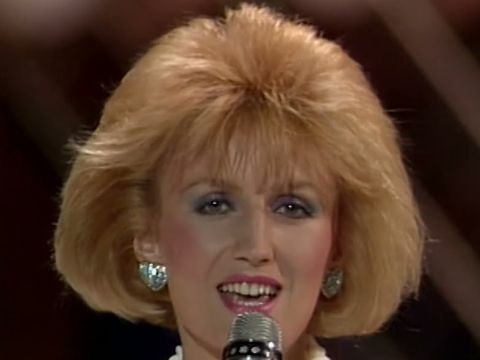
1985 Love Is – Vikki
As the all-female trio in ’84 fared no better than the mixed groups, the BBC stipulated that only solo artists and duos could compete in 1985. As happened quite often in the weaker 1980s fields, the opening song took the crown, and Vikki fared well in the contest itself. Notable contestants this year included 70s star Alvin Stardust and TV presenter Fiona Kennedy. Perfectly coiffeured Vikki Watson attained a very respectable fourth place in a strong contest in Gothenburg with her stop-start pop confection. She then moved to America to pursue her dreams and re-invented herself as a New Age singer, now called Aeone, under which guise she has achieved considerable success. A long journey from hairspray and Eurovision.
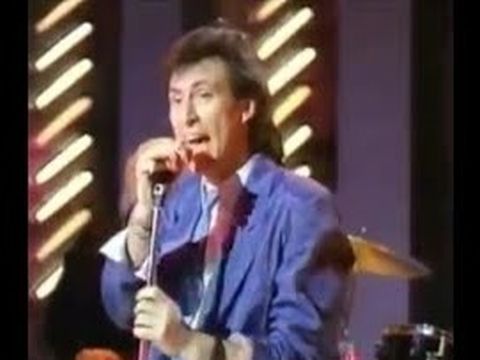
1986 Runner In The Night – Ryder
By 1986 groups were allowed back, and to celebrate, a new incarnation of the 60s hitmakers Vanity Fair turned up. They were joined by quite a variety of styles, at least compared to the previous few years. The outcome was the first British Eurosong that could be classified as “rock” – well light rock, but still something of a departure. Ryder’s lead singer was the son of veteran actor Bill Maynard, who had entered the very first UK selection in 1957. After the demise of Ryder, Maynard enjoyed success in stage musicals in the UK.
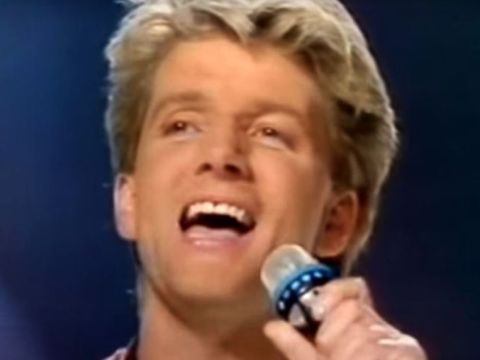
1987 Only The Night – Rikki
1987 saw somewhat less variety and nobody remotely famous among the participants, despite the number of finalists being upped to ten. As in 1983 and 1985 the first song performed took the crown, presumably because the jurors had awarded Rikki points in the hope that something better would come along, but nothing did. After the UK’s poorest result to date in Europe, the regional juries were scrapped and replaced by telephone votes. Scottish singer Rikki (Richard Peebles) had sung with sixties hitmakers Marmalade but was also a taxi driver when he took to the Eurovision stage with a tartan sash. Sadly he produced the worst UK result to date with a thirteenth place finish, although of course today that would be a result!.
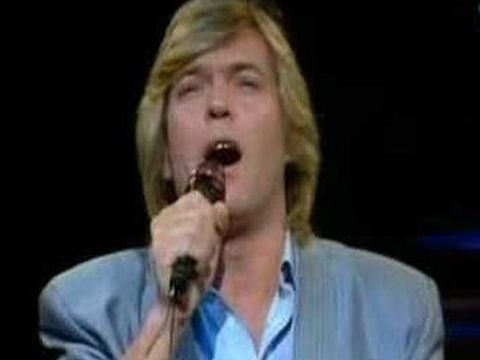
1988 Go – Scott Fitzgerald
The 1988 final reverted to eight songs, and for the first time, “experts” passed comment on the songs after each was performed. This practice was to continue for the next two years until it was deemed too prejudicial to the voting. Scott Fitzgerald was the only “name” and his final song easily saw off the opposition. Scott had had a Europe wide hit with Yvonne Keeley in the seventies, “If I Had Words”. His Eurosong was co-written by Julie Forsyth, son of Bruce, and finished one point behind Celine Dion (much to Brucie’s chagrin). It’s fair to day that their careers diverged at this point.
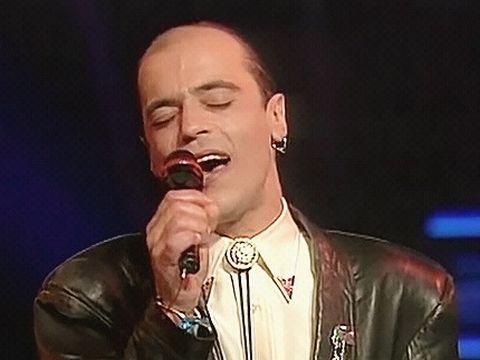
1989 Why Do I Always Get It Wrong – Live Report
In 1989 one very powerful singer swung the contest in a field of unknowns. Pony-tailed Ray Caruana lifted “Why Do I Always Get It Wrong” to new heights above a field of more traditional Eurovision styles. One of the big ballads, “Shame” was later covered by Elkie Brooks. Maybe the least pretty entrants ever, Live Report these guys made it to Eurovision and almost won thanks to a good song and very great vocals. Quite a remarkable result for a sombre song in the glitter laden 1989 contest. Lead singer Ray Caruana later tried to sing for his native Malta.
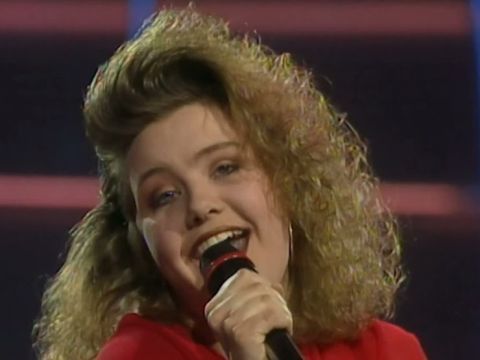
1990 Give A Little Love Back To The World – Emma
1990 saw the first contest after the downfall of the Berlin Wall and across the continent composers were penning ditties about the world, peace and love. In this context it’s no surprise that Emma’s bang-on-the-money song romped to victory, leaving in it’s wake contributions from TV presenter Kim Goody and seventies pop stars John Miles and Bay City Roller Les McKeown. Big haired fifteen year old Emma was the youngest ever UK singer and sang her hymn to peace in Zagreb with the major help of big-voiced Miriam Stockley on backing vocals.
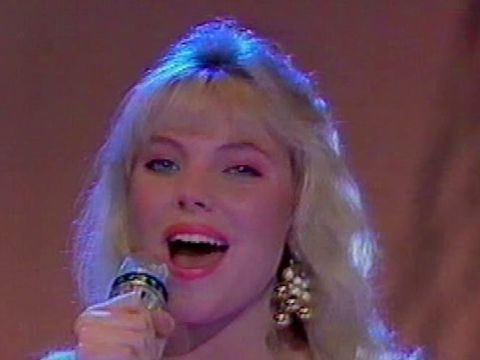
1991 A Message To Your Heart – Samantha Janus
The peace vibe was still alive and well in 1991 as Samantha Janus (now Womack) song somewhat bizarrely married the on-topic message with a presentation in the style of Belle and The Devotions seven years earlier. Honest old fashioned singers like veteran Malcolm Roberts were left standing. Samantha (aka Ronnie Mitchell) took to the Roman Eurovision stage dressed like a hooker to sing a song about global starvation. Go figure. After a dire result in 1991 it was quite clear that her future lay in acting, as has been proved by her awesome success. The only UK Eurovisioner you can still see three times a week.
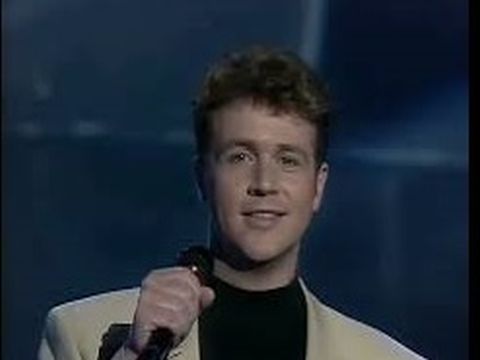
1992 One Step Out Of Time – Michael Ball
In 1992 the BBC reverted to one well-known singer to present eight final songs. The first choice was West-End crooner Michael Ball. Several long-standing Song For Europe contributors were present in the final, a final which contained several classic ballads. The British public however showed it had still not lost the knack of automatically going for the “bouncy one” and so “One Step Out Of Time” went to Malmo where an impressive performance lifted the song to second behind an Irish ballad that was arguably weaker than some of Michael’s SFE songs. Mr Ball later claimed that he’d rather have pins stuck in his eyes than do Eurovision again.
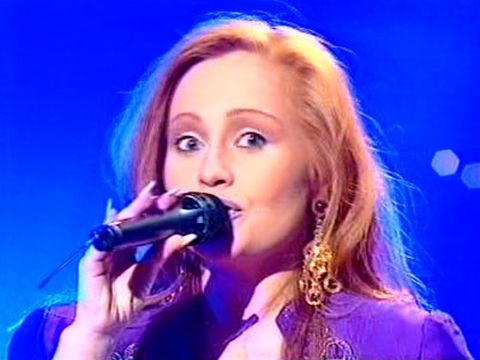
1993 Better The Devil You Know – Sonia
It all happened again in 1993 as Sonia showed us that she could handle a variety of styles quite different from her Stock Aitken Waterman back catalogue. The viewers again went for the predictable, bouncy and quite retro “Better The Devil You Know”, and once again a professional show saw the UK finish runner-up to another Irish ballad.
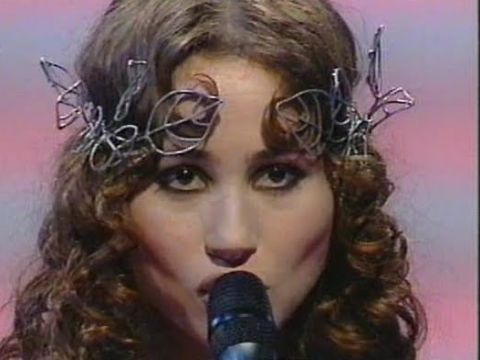
1994 Lonely Symphony – Frances Ruffelle
In 1994 there was no opportunity to vote for the bouncy one as there wasn’t one!. Frances Ruffelle (who?) sang six songs that ranged from midtempo to downbeat, to a generally underwhelmed public. There was a note of controversy when Ruffelle wore a patriotic T-shirt during “Lonely Symphony” which many inferred as a subtle message to vote for her own favourite song. The song was indeed chosen, but was renamed and re-arranged with a much chunkier backing track for the Eurovision final. Frances can still be seen around the West End from time to time.
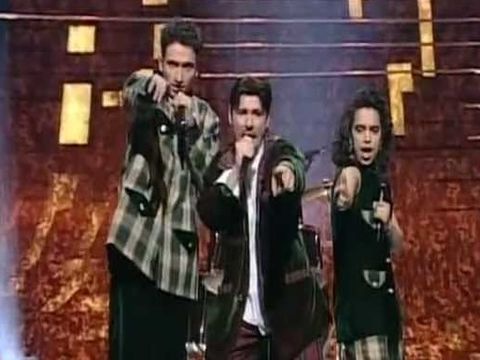
1995 Love City Groove – Love City Groove
As the BBC were again having trouble finding artists another new approach was needed for 1995 and veteran pop producer Jonathan King stepped in to take charge of the selection. The end result was a very successful final in commercial terms which saw both the winning song and the third place song by Deuce crack the UK top 10, and entries by Dear Jon, Londonbeat and Sox (featuring Samantha Fox) make the lower reaches of the top 75. Love City Groove were put together for the contest and their rap number was a brave attempt to try something different at the contest. It was a big hit single but they were unable to repeat the magic with later releases and split.
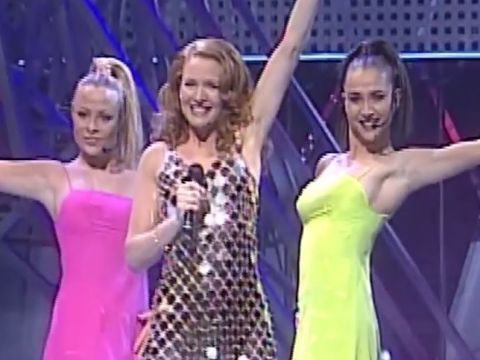
1996 Ooh Aah Just A Little Bit – Gina G
King stayed in charge for 1996 but the SFE was renamed “The Great British Song Contest” and was scaled down to a four song final after a semi-final presented on BBC1. Gina G romped to victory and a worldwide smash, the only other notable performers were hitmaker Zeitia Massiah and moderately successful boy band Code Red. Whilst the juries turned up their noses but the song became a worldwide bit and Gina backed it up with four more top forty hits. She returned to the UK final in 2005 but sadly finished last.
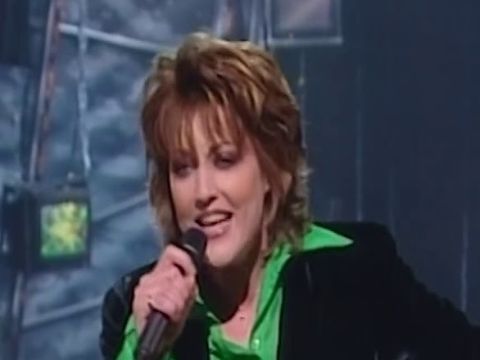
1997 Love Shine A Light – Katrina & The Waves
The same format continued in 1997 but the semi-final was sadly relegated to Radio 2 morning show listeners, a process that would stay in place for the next six years. Katrina & The Waves were the only remotely well known act, and eased to victory with few problems. Katrina Leskanich and her Waves first came to attention in 1985 with “Walking On Sunshine”, and their career was on the wane when Waver Kimberley Rew submitted for Eurovision a song first written in aid of the Samaritans. Katrina went on to co-host the special show to mark fifty years of the contest.
